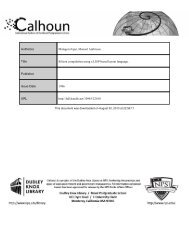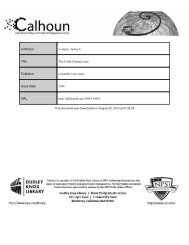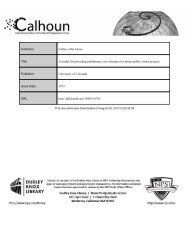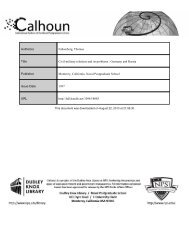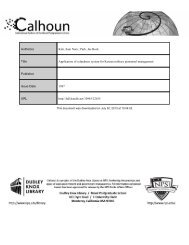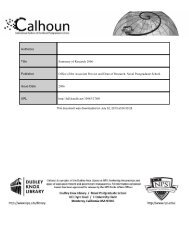- Page 1 and 2:
Author(s) Title Publisher Issue Dat
- Page 3 and 4:
The research presented at the sympo
- Page 5 and 6:
Preface and Acknowledgements Those
- Page 7 and 8:
The NPS A Team Rear Admiral James B
- Page 9 and 10:
4 th Annual Acquisition Research Sy
- Page 11 and 12:
PANEL -- IMPLEMENTING AN OPEN SYSTE
- Page 13 and 14:
THIS PAGE INTENTIONALLY LEFT BLANK
- Page 15 and 16:
Plenary Panel - Acquisition Reform
- Page 17 and 18:
In May 1996, Rear Adm. Hamilton bec
- Page 19 and 20:
Panel - Enhancing Collaborative Cap
- Page 21 and 22:
Collaborative IT Tools Leveraging C
- Page 23 and 24:
Group’s Perceived Usefulness Grou
- Page 25 and 26:
diagnose collaborative capacity enc
- Page 27 and 28:
Organization A Problem Interagency
- Page 29 and 30:
Incentives - Collaboration as a pre
- Page 31 and 32:
Two other frequently cited barriers
- Page 33 and 34:
Panel - Analytic Approaches to Shap
- Page 35 and 36:
Discussant: Michael McGrath - Deput
- Page 37 and 38:
Panel - Strategic Sourcing Wednesda
- Page 39 and 40:
Abstract In this paper, we examine
- Page 41 and 42:
support from the taxpayer. A key co
- Page 43 and 44:
etc. (Figure 1) (Kraljik, 1983). Vi
- Page 45 and 46:
that companies adopted a strategic
- Page 47 and 48:
Benchmarking Industry According to
- Page 49 and 50:
80% 70% 60% 50% 40% 30% 20% 10% 0%
- Page 51 and 52:
initiatives. In efforts to reduce s
- Page 53 and 54:
eduction goals. Also, in the same m
- Page 55 and 56:
Conclusion The DoD is struggling to
- Page 57 and 58:
Gabbard, E. G. (2004, April). Strat
- Page 59 and 60:
Staff. (2005, December 8). Hacket r
- Page 61 and 62:
Panel - Implementing RFID in the De
- Page 63 and 64:
What Is the Right RFID for Your Pro
- Page 65 and 66:
Introduction The evolution and appl
- Page 67 and 68:
Literature Review RFID technology w
- Page 69 and 70:
The reader is a device used to coll
- Page 71 and 72:
Active tags sometimes have sensors
- Page 73 and 74:
An RFID network with open architect
- Page 75 and 76:
Passive tag application: Railcar ta
- Page 77 and 78:
This system has lowered the risk of
- Page 79 and 80:
Because of the temperature-induced
- Page 81 and 82:
Thereafter, through a process of tr
- Page 83 and 84:
to be read at a few inches by an op
- Page 85 and 86:
RFID technology has even enhanced s
- Page 87 and 88:
The Costs of RFID operation An RFID
- Page 89 and 90:
• Abandonment: The ability to aba
- Page 91 and 92:
Fleisch, E., & Tellkamp, C. (2005).
- Page 93 and 94:
Williams, D. (2005, August 4). Pres
- Page 95 and 96:
logistics systems from the military
- Page 97 and 98:
Panel - Transforming the DoD Acquis
- Page 99 and 100:
upon the best knowledge and practic
- Page 101 and 102:
cost, this form appears to be the m
- Page 103 and 104:
access to, and conducted his analys
- Page 105 and 106:
organizational problems surface thr
- Page 107 and 108:
Change in analytic framework. Burea
- Page 109 and 110:
As we look at the effort to change
- Page 111 and 112:
interpretation or narrative. What
- Page 113 and 114:
common construction. Rather, sense-
- Page 115 and 116: There will be a temptation for acto
- Page 117 and 118: modeling suite. The key comparison
- Page 119 and 120: This model provides us also with th
- Page 121 and 122: here, particularly if the organizat
- Page 123 and 124: organization identified through pri
- Page 125 and 126: Levitt, R.E., Thomsen, J., Christia
- Page 127 and 128: BACKGROUND To an extent, we are add
- Page 129 and 130: Concept Refinement Concept Decision
- Page 131 and 132: some subset of commercial “best p
- Page 133 and 134: transforms the value of a public-se
- Page 135 and 136: We also assume that since the gover
- Page 137 and 138: Of course, we know in reality that
- Page 139 and 140: CONCLUSIONS The acquisition of publ
- Page 141 and 142: Panel - Issues in Acquisition and P
- Page 143 and 144: To What Extent are DoD Activities C
- Page 145 and 146: NAVSUP Data Call (2003 and 2004) FI
- Page 147 and 148: exemption from a particular regulat
- Page 149 and 150: time in the procurement schedule, a
- Page 151 and 152: should be fully supported by applic
- Page 153 and 154: example, federal government, state
- Page 155 and 156: ADR Techniques Traditional litigati
- Page 157 and 158: out the top three with 25.7% of res
- Page 159 and 160: It is a consensus building, public
- Page 161 and 162: Investigative Question 1—Conclusi
- Page 163 and 164: Question 3b: Did the ADR process us
- Page 165: suited than another to resolution.
- Page 169 and 170: customer, and each of these service
- Page 171 and 172: Panel -- Implementing an Open Syste
- Page 173 and 174: Open Systems and Modular Open Syste
- Page 175 and 176: procurement planning phase include
- Page 177 and 178: procurement documents and specific
- Page 179 and 180: system technical architecture requi
- Page 181 and 182: These evaluation factors are tradit
- Page 183 and 184: In the Cost Reimbursement contract
- Page 185 and 186: technical, schedule, and past perfo
- Page 187 and 188: Developing Performance Based Requir
- Page 189 and 190: The DoD Performance Specification d
- Page 191 and 192: due to many of the reasons presente
- Page 193 and 194: even if there were ten other upgrad
- Page 195 and 196: software developers can employ when
- Page 197 and 198: Conducting this analysis will be as
- Page 199 and 200: integration of “best of breed”
- Page 201 and 202: Reform of Budgeting for Acquisition
- Page 203 and 204: 350000 300000 250000 200000 150000
- Page 205 and 206: In fact, the disagreement between t
- Page 207 and 208: Functional Area Analysis D O T M L
- Page 209 and 210: Though many in Washington blame the
- Page 211 and 212: In response to an open-ended questi
- Page 213 and 214: CAPITAL BUDGETING IN THE DoD AND TH
- Page 215 and 216: investment. Full funding also helps
- Page 217 and 218:
c. Functional Requirements If it is
- Page 219 and 220:
4. Budgeting Phase of Capital Progr
- Page 221 and 222:
private firm, one can combine the t
- Page 223 and 224:
4. Acceptance of a project using th
- Page 225 and 226:
Another disadvantage of the payback
- Page 227 and 228:
Another guideline is that firms mus
- Page 229 and 230:
This concept has remained consisten
- Page 231 and 232:
purchases. Also, the Office of Mana
- Page 233 and 234:
CONCLUSIONS The current practices o
- Page 235 and 236:
REFERENCES Bierman Jr., H., & Smidt
- Page 237 and 238:
Ratnam, G. (2005, December 12). Big
- Page 239 and 240:
Brian C. Payne, Captain Instructor
- Page 241 and 242:
A Transactions Cost Economics (TCE)
- Page 243 and 244:
SECTION 1: INTRODUCTION This report
- Page 245 and 246:
SECTION 2: REVIEW OF TRANSACTION CO
- Page 247 and 248:
cooperative agreements, but since t
- Page 249 and 250:
characteristic that defines many ou
- Page 251 and 252:
The added risk faced by military co
- Page 253 and 254:
J) Some Empirical Evidence On the w
- Page 255 and 256:
unproductive bargaining and influen
- Page 257 and 258:
also include the costs of internal
- Page 259 and 260:
N) Results from a Bargaining-game M
- Page 261 and 262:
efforts to screen for reliability a
- Page 263 and 264:
Program Managers lead Program (Proj
- Page 265 and 266:
Table 2. Research, Development, Tes
- Page 267 and 268:
To minimize transaction costs for t
- Page 269 and 270:
A recent initiative to accommodate
- Page 271 and 272:
Technical complexity within a syste
- Page 273 and 274:
As briefly introduced above in Sect
- Page 275 and 276:
Table 5. Typical Contract Type by P
- Page 277 and 278:
multiyear procurements and other ty
- Page 279 and 280:
Alpha Contracting reduces procureme
- Page 281 and 282:
SECTION 4: SYNTHESIS AND CONCLUSION
- Page 283 and 284:
Finally, DoD contracting practice w
- Page 285 and 286:
Productive Effort Parameters Unprod
- Page 287 and 288:
f. Operational Significance. (added
- Page 289 and 290:
enchmarks, and the like. Elements T
- Page 291 and 292:
Cooter, R., Marks, S., & Mnookin, R
- Page 293 and 294:
Nissen, M. E. (1997). JSOW alpha co
- Page 295 and 296:
Development of Measures of Success
- Page 297 and 298:
of acquisition practitioners to all
- Page 299 and 300:
Attributes of Good Metrics. Certain
- Page 301 and 302:
Center ACEs were from separate loca
- Page 303 and 304:
unique. Every interview transcript
- Page 305 and 306:
appropriate. However, when asked if
- Page 307 and 308:
they are receiving in their attempt
- Page 309 and 310:
forcing each activity and report to
- Page 311 and 312:
Force Space Command System Program
- Page 313 and 314:
corporate Air Force acquisition ini
- Page 315 and 316:
Hayes, B. Measuring Customer Satisf
- Page 317 and 318:
Pope, K. Measuring the Effect of th
- Page 319 and 320:
Using KVA and Real Options Analysis
- Page 321 and 322:
Estimating Return on Investment and
- Page 323 and 324:
This research project gathered info
- Page 325 and 326:
“I have determined that the curre
- Page 327 and 328:
On Budget Allocation to Increase Op
- Page 329 and 330:
Panel - Perspectives in Program Man
- Page 331 and 332:
Best Practices: Better Support of W
- Page 333 and 334:
When Should You Terminate Your Own
- Page 335 and 336:
- Management activities, expenditur
- Page 337 and 338:
RF COMMUNICATIONS DIVISION ROCHESTE
- Page 339 and 340:
REQUIREMENT HF MANPACK TACSAT VHF/F
- Page 341 and 342:
Figure 4. System Components INTEGRA
- Page 343 and 344:
My best technical experts would spe
- Page 345 and 346:
“JULIE-GATE” The program was st
- Page 347 and 348:
All agreed it was finally over, and
- Page 349 and 350:
A short time later, the world waite
- Page 351 and 352:
some of NASA’s Mars probes) or if
- Page 353 and 354:
managing systems with tipping point
- Page 355 and 356:
The second example of tipping point
- Page 357 and 358:
Although the plant did not begin co
- Page 359 and 360:
snt - add-new-tasks strength {work
- Page 361 and 362:
einforcing loop. We show how, throu
- Page 363 and 364:
there is no more project backlog. F
- Page 365 and 366:
Frac requiring rework (Frw ) 1.0 0.
- Page 367 and 368:
Total Backlog as a Fraction of Inti
- Page 369 and 370:
provide opportunities for improveme
- Page 371 and 372:
divided into avoiding tipping point
- Page 373 and 374:
The horizontal axis of Figure 14 re
- Page 375 and 376:
Total Backlog Total Backlog/Initial
- Page 377 and 378:
deadline and ensuring that it is re
- Page 379 and 380:
unrealistic due to drastic changes
- Page 381 and 382:
Kharbanda, O., & Pinto, J. (1996).
- Page 383 and 384:
Panel - Service Contracting Thursda
- Page 385 and 386:
Managing the Services Supply Chain
- Page 387 and 388:
include professional, administrativ
- Page 389 and 390:
Service Characteristics and their I
- Page 391 and 392:
given stage is made dependent on th
- Page 393 and 394:
contracted effort. The procurement
- Page 395 and 396:
Construction, Repair and Maintenanc
- Page 397 and 398:
The second phase of the procurement
- Page 399 and 400:
human capital. This is partially du
- Page 401 and 402:
for the contracting of services wil
- Page 403 and 404:
Yet a RAND study of the Army showed
- Page 405 and 406:
services, the Army appears to have
- Page 407 and 408:
(janitorial) services, food service
- Page 409 and 410:
Each requirement organization provi
- Page 411 and 412:
Brown, S. W., Gummesson, E. Edvards
- Page 413 and 414:
Gronroos, C. (1982). Strategic mana
- Page 415 and 416:
What Works Best when Contracting fo
- Page 417 and 418:
Panel - Earned Value Management Thu
- Page 419 and 420:
Measuring Uncertainty in Earned Val
- Page 421 and 422:
level of rate-of-change and the abs
- Page 423 and 424:
But, if the widget is only half com
- Page 425 and 426:
so more rapidly in environments cha
- Page 427 and 428:
Impending Task Delays (ITD) can be
- Page 429 and 430:
with: v: In the Fisher model, it re
- Page 431 and 432:
In discrete time form, the estimati
- Page 433 and 434:
Thus, various types of delay such a
- Page 435 and 436:
Entropy The uncertainty (non-specif
- Page 437 and 438:
Panel - Contractors in Support of M
- Page 439 and 440:
Contractors Supporting Military Ope
- Page 441 and 442:
drivers and other historical refere
- Page 443 and 444:
Another factor driving toward incre
- Page 445 and 446:
number of highly experienced Blackw
- Page 447 and 448:
Unity of command is one of the prin
- Page 449 and 450:
was reimbursed for expenses actuall
- Page 451 and 452:
principles, such as unity of comman
- Page 453 and 454:
aircraft involved in re-supply miss
- Page 455 and 456:
President Cheney) has apparently ma
- Page 457 and 458:
modest proposals for incremental ch
- Page 459 and 460:
In July 1937, the “China Incident
- Page 461 and 462:
President Roosevelt’s assistant,
- Page 463 and 464:
Pilots of the Flying Tigers receive
- Page 465 and 466:
was larger than the marine aid stat
- Page 467 and 468:
Merchant vessels kept Britain in th
- Page 469 and 470:
The final vignette involves Charles
- Page 471 and 472:
contract (Wake Island pre-war). In
- Page 473 and 474:
purposes continues to be the “leg
- Page 475 and 476:
Going to War with Defense Contracto
- Page 477 and 478:
Abstract This paper reports on an e
- Page 479 and 480:
Table 1: Factor loadings and alpha
- Page 481 and 482:
depict causal relationships tested
- Page 483 and 484:
work-related experience than younge
- Page 485 and 486:
Discussion and conclusion On averag
- Page 487 and 488:
2003 - 2006 Sponsored Acquisition R
- Page 489 and 490:
NPS-PM-04-017 Matthews, David. The
- Page 491 and 492:
Technical Reports NPS-GSBPP-03-003
- Page 493 and 494:
THIS PAGE INTENTIONALLY LEFT BLANK



